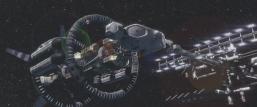IMDB: http://www.imdb.com/title/tt0199753/

|

|

|
| Moss, not as Vinyl Chick | Counter-rotating wheels at last | The glamorous landing |
This film has problems. We open with a narration by the captain of the expedition to Mars, introducing the crew, each with his own personality trait; this feels very forced, and I'd bet it was added after test screenings. Certainly once our heroes are on the surface of Mars it becomes hard to tell them apart. The plot is something of a hotchpotch, clearly gouging ideas out of other films and cramming them still bleeding into the carcass of this one. That's been done before, of course - Alien was just Haunted House In Space, by some lights - but there's never quite the lightning bolt that would make it all fit together and work. Oddly, though, the camerawork and direction are not at all bad - generally building up a sense of place and not distracting from what's going on.
The actors are a very mixed bunch. Most of them don't have much to do except show the audience how the hazards work; of those who do, Terence Stamp plays the generic holy man and dies early. Val Kilmer plays his usual "bad boy" (though at least he's not fully into "action hero" mode, something he does very badly - see The Saint, if you must), whom I suspect is starting to need a lot of makeup assistance to look as young as he did twelve years earlier in Willow.
Carrie-Anne Moss, strangely enough for those of us who've only seen her as Vinyl Chick in the Matrix films, hits her role dead on. Unusually for an actress in a modern film, she's allowed to look more or less her real age; and she comes over very well as the competent and mostly unemotional mission commander. Several reviews complained at her lack of characterisation (usually meaning emotion); I'd suggest these reviewers speak with real pilots and astronauts, and notice how emotions can be cleanly put on hold until there's time to deal with them.
As for the mission itself - well, clearly the film-makers actually talked to someone outside Hollywood for a change, though the IMDB credits no technical advisor. Artificial gravity is provided by two counter-rotating habitat rings, so the spacecraft can still manoeuvre without gyroscopic effects; the ship's drives aren't lit all the time; the Martian surface vehicle uses airbags to cushion its landing... much of this is right. On the other hand, the purely fictional part of the film falls apart badly, in particular when it deals with the robot (which could have been excised completely without damaging the film) and the solution to what's presented as the central problem but which is on the side-lines for most of the time.
Red Planet cost US$75 million to make, and grossed US$17m in the USA. Brian dePalma's Mission to Mars cost US$90 million and made back US$60m. But at least this film isn't downright insulting to the intelligence most of the time.
Overall, not nearly as bad as the critics made it out to be. Maybe they hadn't read enough stories published by John W. Campbell. I enjoyed it, though I'd have liked to see more happening on the ship and less of the more conventional one-by-one deaths on the surface.
Oh, and the zero-g fire is superb.